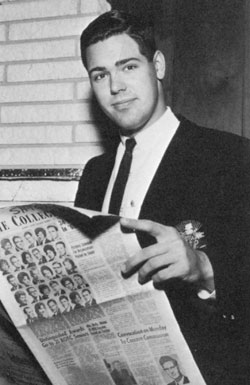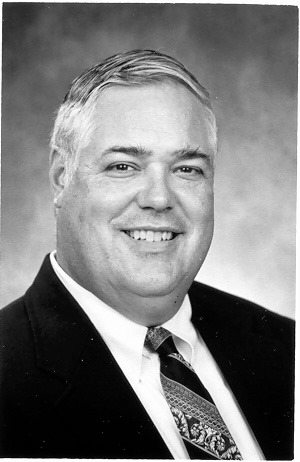Guest Writer
“He created a legend. By the end of his career, everyone recognized it.”
“To this place, and the kindness of these people, I owe everything.” ~ Abraham Lincoln
Robert Howe McGaughey, III, arrived at Murray State in the late summer of 1961. By any important measure, he never left until the 14th of June, 2019.
He would have agreed with Abe Lincoln, but he would be thinking of Murray — not Springfield, Illinois.
He took with him two Murray State degrees, one Ohio University doctorate, and more accolades for teaching, educational leadership and genuine scholarship than most people could acquire in two lifetimes. He left with us two generations of journalists, a handful of new programs and a campus full of memories of the man everyone — from the president to the newest freshman — called “Doc.”
Doc McGaughey grew up in Hopkinsville loving sports, journalism and a good joke. He played baseball and basketball, wrote for student papers and publications, sold ads for newspapers and radio and was a disc jockey for a while as a teenager.
He joined ROTC at Murray State where he was an outstanding student, an athlete and lived at The Murray State News. He majored in history and journalism. He served two years of active duty in the Army before returning to become the first Masters recipient in journalism at Murray State. Then he was off to Ohio University where he earned his doctorate in record time.
His time in the Army and his residency at Ohio University were the only times after 1961 that he was away from Murray or Murray State.
In 1969, he joined the faculty as an instructor in journalism. Five years later he became one of the youngest department chairmen in Kentucky as he began a 25-year career of building a small department with one major into something special. As one of his successors, Dr. Bob Lochte put it:
“Back in the 1970s and ‘80s, when Murray State was barely a university, Doc almost single-handedly created a nationally-accredited program in Journalism and Mass Communications with four undergraduate majors, a Master’s degree, award-winning campus media, and nearly 400 students. All of this happened in a small remote Kentucky town, in a state whose appreciation of higher education largely starts and ends with how good your basketball team is.”
He created a legend. By the end of his active career, everyone recognized it.
His devotion to students was reflected in his Distinguished Professor Award, the Max Carman Outstanding Teacher Award from the SGA and the crowds that surrounded him at every homecoming. He was adviser to several student groups and served for two years as co-head of Elizabeth Residential College.
As chair of journalism, he influenced and led the growth of the University’s public radio station, WKMS-FM. He developed the television production, advertising and public relations majors, and saw them grow into regional suppliers of nationally-known talents.
His profession honored him with a number of awards from the Kentucky Press Association, election as the KPA Education Representative, repeated invitations to the International Radio and Television Society’s annual conference and selection by the IRTS as the Frank Stanton Fellow: the outstanding broadcast educator in America. In 2012 he was named to the Kentucky Press Hall of Fame, joining two of his teachers and one of his former students in that distinction.
The campus recognized him, as well. Doc was proud of pointing out that he had a building named for him: Faculty Hall. (That was a joke, of course. He had others.) Deans, fellow chairs and even presidents referred to him as the students did; he was simply “Doc” to everyone.
His legend, however, was founded most in his care for the students. He was asked to be godfather to the children of his graduates. He provided unpublicized support for students who needed money to travel to a first job; who would have dropped out of school except for his encouragement and support; who would have failed to get needed medical help without his intervention. He even introduced young men and women who later married. He became a legend because he cared, and put everything he had into making his caring a reality.
You will not see him this year at Tent City, or doing “The Comedy Hour” at Lizo, or meeting at Cracker Barrel with his fellow MSU veterans at the periodic ROMEO meetings (“Retired Old Men Eating Out”). For the first time since 1961, Doc McGaughey has, as he used to say, “left the building.”
He left something for you.
Doc left to his colleagues an example of devotion to Murray State and her students. His dedication was to each student — no matter how gifted or how needy.
He left to the students — whether you knew him or not — a legacy of enthusiasm for all things Racer. From athletic games to residential colleges, from All Campus Sing to Great Beginnings, from study times to road trips, he left an example of enjoyment and friendship. Party hard, play hard, study hard and make real friends. For Doc, friends lasted forever. Some of his dearest friends he made as a student at MSU; the rest he made as a faculty member.
And just in case you missed one of his shows — as funny a time as you are likely to have in your life — here is the message with which he left all his audiences:
“If you want to be a good communicator, don’t forget: First, you’ve got to listen. And second: no matter how bad it gets, never, ever lose your sense of humor.”
Robert Howe McGaughey, Feb. 18, 1941 – June 14, 2019.
Legendary.

